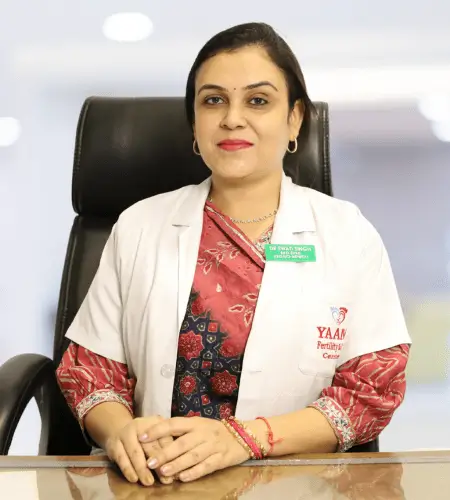3rd Party Reproduction & Gestational Surrogacy

Surrogacy In Indore
Over the past few years, the practice of surrogacy has gained traction among gay couples, couples, and single women.
This assisted reproductive technology offers a beacon of hope for people who are incompetent to carry pregnancy.
Many single parents are overwhelmed by the complexities that come along with surrogacy, but this gist will cover all the intricacies that will make you feel more confident with your journey.
With that being said, if you’re looking for a guide (the best surrogacy in Indore) in your journey of parenthood that showers light in your moments of doubt, it’s time you elevate your chances of taking your baby home with Yaami.
Types Of Surrogacy
Here are the types that need to be defined:
1. 3rd Party Reproduction & Gestational Surrogacy
- Third party reproduction involves use of donor sperm, donor egg or donor embryo to conceive or taking help of gestational surrogate to carry the pregnancy.
- The couple who will raise the baby after delivery are called ‘Intended Parents’.
- The person who will donate the sperm, egg, embryo or carry the pregnancy is the ‘Third Party’.
- Third party reproduction involves teamwork of your fertility physician, psychological counsellor, gamete donor agencies, gestational surrogacy agency, social worker & lawyer.
2. Traditional Surrogacy
- Traditional surrogacy, also known as straight surrogacy, is where the woman carries the pregnancy for the intended parent. Here the surrogate (the child’s biological mother) becomes the egg provider and the carrier.
3. Compensated or Commercial Surrogacy
- Here the surrogate is compensated for her services on top of the medical expenses.
4. Altruistic Surrogacy
- Here the woman agrees to be a surrogate but is not compensated for her services.
5. Independent Surrogacy
- Also known as private surrogacy, is where the surrogate or the intended parents don’t work with any surrogacy agency.
6. Identified Surrogacy
- Here the intended parents already have a gestational carrier in mind before the surrogacy process.
What's The Surrogacy Cost In Indore
The cost of surrogacy in Indore is breakdown into the following major head:
- Surrogate Registration: It’s a process of legal paperwork (between intended parents & surrogates), which includes surrogate screening, medical, and all the checkups, ensuring smooth pregnancy.
- Surrogate Payout: Here’s the list of average surrogacy cost in Indore paid by the intended parents:
Fresh Surrogates | Rs. 3.5 to 4 lakhs |
Experienced Surrogates | Rs. 4 to 5 lakhs |
Medical screening process | Rs. 30k to 40k |
Cycle medication and transfer fees | Rs. 40 to 50k |
Extra pay for carrying twins | Rs. 1.5 to 2 lakhs |
For C-section delivery | Rs. 90k to1.2 lakhs |
For maternity clothing | Rs. 30k to 40k |
Monthly allowance during pregnancy | Rs. 20k to 30k |
- Medications & Expenses: Medical expenses, prenatal care, fertility medicines, and other hormonal treatments range between ₹2,25,000 to ₹3,75,000.
- Additional fees such as counseling, legal and support fees range between ₹1,50,000 to ₹3,75,000.
Treatment & Testing of Surrogacy In Indore
While traditional surrogacy involves fertilisation of the surrogate’s eggs with the father’s sperm through intrauterine insemination, gestational surrogacy is slightly a different procedure.
Here’s a closer look at what to expect during the gestational surrogacy treatment:
Ensure You Are Physically Healthy For Surrogacy
- Here the surrogate needs to undergo a medical screening along with a social and psychological evaluation to ensure they are capable of handling healthy pregnancy.
Complete The Embryo Transfer.
- In this step, the doctor regulates the surrogate’s cycle by prescribing progesterone injections and estrogen replacements.
- After taking these hormones for the 12th week of pregnancy, the embryo transfer procedure will take place.
Get Back To Clinic To Confirm
- The surrogates need to get back to the clinic post-embryo transfer (after one week), where the doctors will inspect the pregnancy hormone levels.
Completion Of Six-Week Ultrasound
- Once the embryo transfer is successfully accomplished, the doctor will execute an ultrasound test during the 6th week of pregnancy.
- The motive behind this test is to hear the heartbeat of the child. Once it’s heard, the surrogate would be released to its own obstetrician-gynecologist.
Why Yaami Fertility & IVF Center Indore Is The Best for Surrogacy?
The journey of surrogacy indeed brings forth a mix of emotions for both the surrogate and intended parents. However, there are quite some moments in the process where you can feel unease or stress.
But with Yaami (which signifies graceful feminine energy), you ain’t alone. You see, with us, you’re not only accessing the best-in-class integrated IVF treatments but also a pillar of support from a dedicated team of fervent fertility experts.
Which qualification in surrogacy is the toughest?
Apart from the medical and other legal criteria, the surrogate must have a successful pregnancy. Also, the surrogate should not be on any government financial assistance.
What happens when the surrogate is pregnant?
Once your surrogate is pregnant, it’s time you (intended parents) get involved emotionally with the pregnancy and celebrate this major milestone.
Who is eligible to be a surrogate?
The surrogate must be:
- Married.
- Mentally fit.
- She must not have gone through any surrogacy process.
- Aadhar card must be linked.
What is the age limit for surrogacy?
The age limit for surrogacy is between 21 and 45 years.
Does every surrogacy begin with In Vitro Fertilization (IVF)?
No only Gestational Surrogacy begins with IVF.
In surrogacy, whose egg is used?
Generally, there are two forms of surrogacy:
- Gestational Surrogacy: Here, the eggs are provided either by the mother or donor.
Traditional Surrogacy: Here, the surrogate’s egg is used for conception.
Why is surrogacy banned in India?
According to the Assisted Reproductive Technology (Regulation) Act, 2021 (ART Act), you’re not eligible for surrogacy if you’re a:
- Unmarried male or female.
- Homosexual.
- Transgender.
- Live-in couple.
- A married couple with a child.
Besides this, you can’t even transfer (without the permission of Indian authorities) your embryos, zygotes and gametes, directly or indirectly, outside India for personal use.
How long does the surrogacy process take?
It usually takes around 15-18 months, right from the application at the beginning until you’re holding your newborn infant.
What is IVF surrogacy?
In IVF, fertilization takes place inside the glass tube, i.e. outside the body.
Yaami Fertility & IVF Center
Start Your Parenthood Journey


